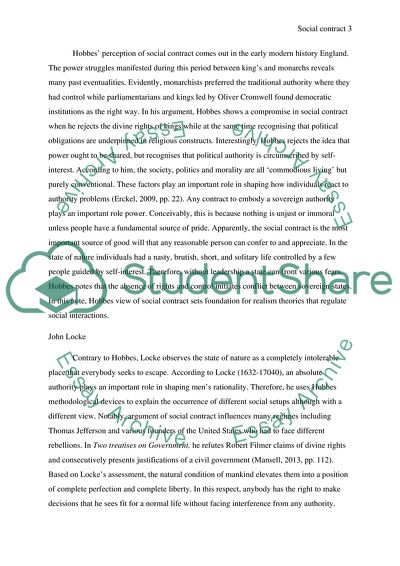Cite this document
(Hobbes, Lockes, and Rousseaus Views of Social Contract Literature review Example | Topics and Well Written Essays - 1500 words, n.d.)
Hobbes, Lockes, and Rousseaus Views of Social Contract Literature review Example | Topics and Well Written Essays - 1500 words. https://studentshare.org/social-science/1847588-what-do-we-mean-by-social-contract-refer-to-the-theories-proposed-among-others-by-hobbes-locke-and-rousseau-compare-and-contrast-their-theories-of-the-state-of-nature-and-the-respective-roles-of-government
Hobbes, Lockes, and Rousseaus Views of Social Contract Literature review Example | Topics and Well Written Essays - 1500 words. https://studentshare.org/social-science/1847588-what-do-we-mean-by-social-contract-refer-to-the-theories-proposed-among-others-by-hobbes-locke-and-rousseau-compare-and-contrast-their-theories-of-the-state-of-nature-and-the-respective-roles-of-government
(Hobbes, Lockes, and Rousseaus Views of Social Contract Literature Review Example | Topics and Well Written Essays - 1500 Words)
Hobbes, Lockes, and Rousseaus Views of Social Contract Literature Review Example | Topics and Well Written Essays - 1500 Words. https://studentshare.org/social-science/1847588-what-do-we-mean-by-social-contract-refer-to-the-theories-proposed-among-others-by-hobbes-locke-and-rousseau-compare-and-contrast-their-theories-of-the-state-of-nature-and-the-respective-roles-of-government.
Hobbes, Lockes, and Rousseaus Views of Social Contract Literature Review Example | Topics and Well Written Essays - 1500 Words. https://studentshare.org/social-science/1847588-what-do-we-mean-by-social-contract-refer-to-the-theories-proposed-among-others-by-hobbes-locke-and-rousseau-compare-and-contrast-their-theories-of-the-state-of-nature-and-the-respective-roles-of-government.
“Hobbes, Lockes, and Rousseaus Views of Social Contract Literature Review Example | Topics and Well Written Essays - 1500 Words”. https://studentshare.org/social-science/1847588-what-do-we-mean-by-social-contract-refer-to-the-theories-proposed-among-others-by-hobbes-locke-and-rousseau-compare-and-contrast-their-theories-of-the-state-of-nature-and-the-respective-roles-of-government.


